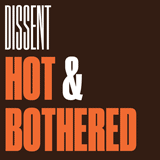
An interview with Eric Fink, a democratic socialist candidate for State Senate in North Carolina, who is challenging one of the lawmakers behind the state’s HB2 “bathroom bill.”

As Jenny Diski acknowledged, describing things as they are—even the unmentionable things—is the first step to making them one’s own.

Business interests and politics have long factionalized the Turkish press. With the government cracking down harder than ever on its opponents, the media is now moving from diversity toward monopoly.

Two books offer new insights into the last forty-five years of uproar against abortion rights, and the fight to hold onto them.

Four short essays about recent protests at universities—Yale, Missouri, Princeton, and beyond—and the debates they’ve provoked.
With contributions by David A. Bell, Marcia Chatelain, Jim Sleeper, and Anne-Laure White.

Last December’s floods in Chennai illustrated the devastating consequences of a development model that puts profits before people. But they also hinted at what a democratic response to climate disaster might look like.

Beyond the delegate race lies the Sanders campaign’s larger potential: that a rising generation will emerge from it to transform American political life in ways that until recently seemed impossible. Here’s where they might start.

“Having it all” is not a feminist theory of change.

While fossil fuel companies and their political allies continue to fulminate, they are losing ground with public opinion—thanks in no small part to the divestment movement on college campuses.

A conversation with Irish journalist Ronan Burtenshaw about the 100th anniversary of the Easter Rising, its legacy, and the Irish left today.

The new wave of true crime series has spawned an entire online subculture of amateur sleuths—not to mention vigilantes. But where do we draw the line between journalism, protest, and entertainment?

Environmental regulations never got the chance to destroy whole sectors of “good jobs” as their opponents promised they would—fossil fuel companies themselves, backed by neoliberal policy, destroyed them instead.

While adults worry Trump’s bullying style sets a bad example, white kids are pointing to their classmates and saying, “Donald Trump will send you away.”

For the 100th episode of Belabored, a special live-recorded discussion with Mark Engler, about his new book This Is an Uprising, and what the labor movement can draw from popular protest.

It’s the end of the world as we know it. And we don’t feel fine: we’re hot, we’re bothered, and we’re making a podcast.




















